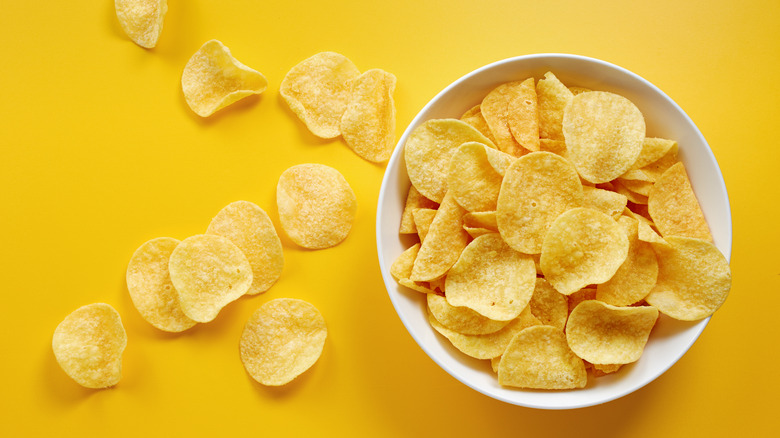The Real Reason It's So Easy To Eat Too Many Chips
One chip, two chips, three chips... aaand there goes the whole bag o' chips. Indeed, "I'll just have a handful of chips" is possibly one of the biggest lies that anyone has ever told themselves. We've all been there — lazing in front of the TV after a long day at work, at a party where you're not in the mood to interact with anyone so you hover by the food table instead, or just desperately trying to devour a quick "meal" to satisfy your hunger between work meetings. Chips — whether you prefer potato chips, tortilla chips, pita chips... heck, even pretzel chips — are crispy, salty snacks that are cheap, convenient, and best of all, delicious.
So, why is it so easy for us to wolf down a tremendous amount of chips — greasy crumbs and all — without even thinking about it? Keep reading for a quick science lesson that explains the reason behind your chip habits.
The salt in chips (and other foods) literally makes you want more
Salt is added to so much of what we eat, and we're eating way too much of it. According to the Centers for Disease Control and Prevention (CDC), the 2020–2025 Dietary Guidelines for Americans recommend that people consume less than 2,300 milligrams of sodium each day. However, 90% of Americans two years old or older consume an average of 3,400 mg. The U.S. Food and Drug Administration (FDA) also recently urged food manufacturers to reduce the sodium content of their processed, packaged, and prepared products by 12% over 2.5 years (via FDA).
A 2016 study published in the Journal of Nutrition demonstrates that salt is the main culprit in making us over-eat. A research group from Deakin University in Victoria, Australia found that adding salt to meals significantly increases foods' pleasantness. The study's subjects preferred the taste of high-salt meals to low-salt meals. Yet, even more interesting is that salt made people eat roughly 11% more food and calories, regardless of the meals' fat content. Some of the subjects were sensitive to the taste of fat, therefore typically eating less. "But when we add salt to that food, all of a sudden those controls are gone," the study's principal investigator Russell Keast told TIME.
Next time you dive into a bag or bowl of chips, feel free to indulge. Just be cognizant of the extreme amounts of sodium you're shoving into your mouth.

